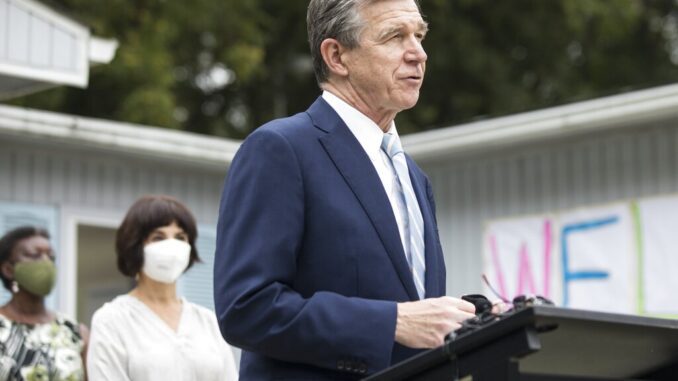
RALEIGH — Gov. Roy Cooper’s office issued a press release on Oct. 17 announcing more than $30.1 million in funding from the N.C. Volkswagen Settlement Program for new “clean school buses.” The awards will pay for 161 new buses across the state, including 43 new electric school buses.
More than $16.5 million of the funding will be for 43 electric school buses and associated charging infrastructure.
“Today is a good day for the health and pocketbooks of North Carolinians as we continue on our path to clean transportation,” Cooper said in the release. “Transitioning to cleaner school buses reduces greenhouse gas emissions, lowers costs to our schools, creates great manufacturing jobs and reduces pollution in our poorer communities.”
The funding comes from Phase 2 of the N.C. Volkswagen Settlement Program, which holds the remaining $68 million of the state’s share of a national settlement with Volkswagen.
Grant recipients include public schools, charter schools and a tribal school in 84 counties. Rural counties will see 130 bus replacements. As the buses are replaced, the old buses are scheduled to be destroyed, “ensuring they no longer pollute the air in communities near schools,” according to the release.
“Switching to new low- and zero-emission school buses has immediate public health benefits for the children who ride them and improves air quality in our communities,” said Department of Environmental Quality (DEQ) Secretary Elizabeth S. Biser.
According to the release, the new buses will “reduce emissions of nitrogen oxides (NOx) by 126 tons over their lifetimes combined.
The full list of awarded projects can be found on DEQ’s website.
DEQ has awarded more than $1 million from the settlement funds to state agencies to install Level 2 zero-emission vehicle charging infrastructure. The 103 charging ports will be installed at 25 sites on state properties ranging from parks to colleges and office buildings.
Thirteen chargers will be used for state agency fleet vehicles and to “support Gov. Cooper’s efforts under Executive Order No. 80 to transition the state motor fleet to zero-emission vehicles, while the remainder will be available for public use.”
DEQ is still accepting rebate applications for Level 2 charging infrastructure installations at workplaces and multiunit dwellings. Applications are on a first-come, first-served basis and will continue until all of the funding is depleted. Information about the funding and how to apply are on DEQ’s website.
Electric school buses have been criticized over their cost, which can be up to three times more than a gas/diesel-powered bus, coming in at an average of $400,000 per vehicle. The awards listed by DEQ for electric buses show costs landing anywhere from $368,864 to $426,827.
Additionally, charging stations can be expensive and take up more space as well as the battery range being an obstacle when it comes to long bus routes. Most electric buses in current use have been cited to have service ranges of just 100 to 120 miles on a single charge.
The lithium-ion batteries used by electric vehicles, including buses, have also been known to catch fire and if the vehicle is in an accident the fire from the battery can create safety issues because they burn hotter and longer than a normal bus fire.
The electric buses, however, have had lower maintenance costs and estimated savings for districts of between $4,000 to $11,000 per bus per year over their diesel counterparts.
Earlier this year in March, the Biden Administration’s Environmental Protection Agency announced $17 million in electric school bus rebate awards as part of the 2021 American Rescue Plan (ARP) and the 2021 Diesel Emissions Reduction ACT (DERA). ARP funding totaling $7 million was directed to school districts in underserved communities to replace diesel buses with zero-emission electric models. Another $10 million in DERA rebates were earmarked for 444 school bus replacements nationwide.
The EPA’s new Clean School Bus rebate program under the Bipartisan Infrastructure Law, which provides an unprecedented $5 billion over five years, recently closed its application period.




